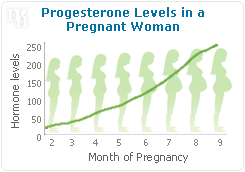Estrogen and progesterone are the two strongest hormones involved in the reproductive cycle, and during pregnancy, they play a crucial role in the development of the baby. It is important that these hormones are working correctly, so the pregnancy can go along as planned.
Keep reading to find more about pregnancy and progesterone levels.
What Does Progesterone Have to Do with Pregnancy?

During a normal pregnancy, progesterone levels can double or triple within the first few weeks of pregnancy. The body does this to ensure care for the child. Later, progesterone levels can be as high as 15 times the normal amount. This is done to protect the fetus and makes sure it is receiving the popper nutrients from the woman's body.
The placenta creates extra progesterone during pregnancy. This progesterone prevents early contractions which could cause an early delivery, and helps to nourish and protect the baby.
Continue reading to find out more about pregnancy and progesterone levels.
What Does Progesterone Do?
Progesterone keeps the uterus from having contractions, and also has many other functions.
Here is a brief list of the things progesterone does for the body during pregnancy:

- Helps to regulate the menstrual cycle
- Prepares the lining of the uterus for implantation
- Produces a rise in temperature after ovulation, which remains until menstruation occurs
- Keeps the lining of the uterus thick which is necessary for a successful pregnancy
- Creates a nutrient rich environment for the baby by increasing glycogen and arterial blood to the lining of the uterus
- Causes the cervix to thicken and create a mucus plug which prevents bacteria from entering the uterus
Keep reading below to discover more information on treatment for hormone balance during pregnancy.
Treatments for Hormone Balance during Pregnancy
Progesterone is important for all functions in the body. In order to achieve and maintain a healthy pregnancy, it is crucial for progesterone levels to change and increase during this time in a woman's life.
It should also be known that a healthy diet and a regular exercise routine are important to maintain the body, and most importantly to reduce stress.
Some alternative medicines are likely to help as well, like teas and certain supplements, but if you are pregnant it is important to talk to your doctor about pregnancy and progesterone levels, and proper treatment for your unique body.
Click on the link for more information about treatments for progesterone imbalance.